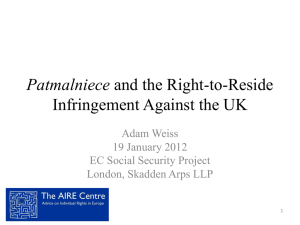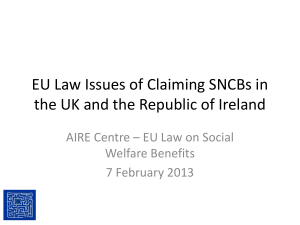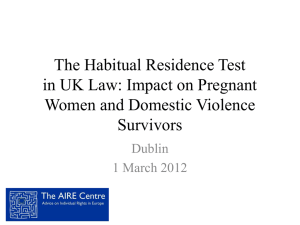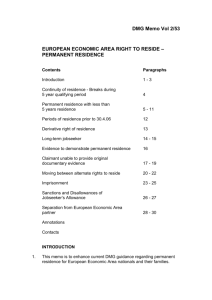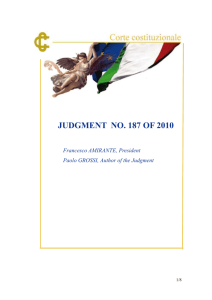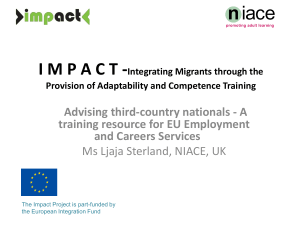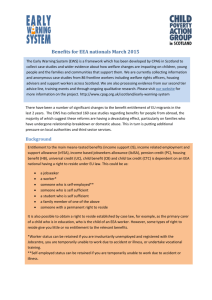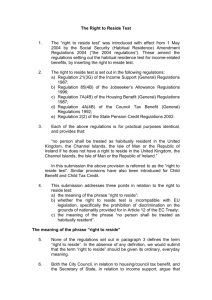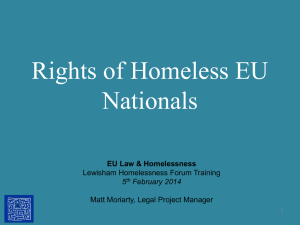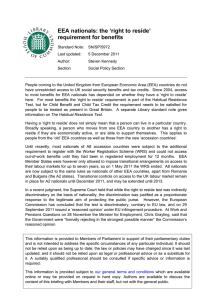Right to Reside Test
advertisement
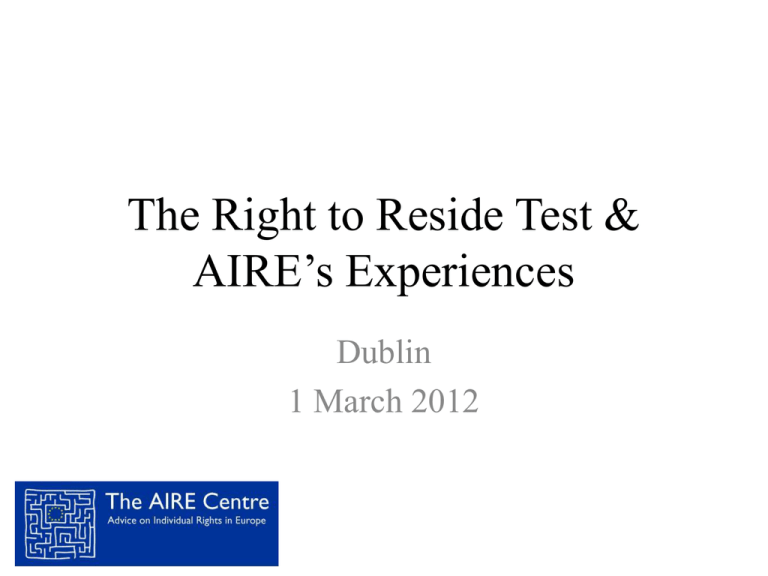
The Right to Reside Test & AIRE’s Experiences Dublin 1 March 2012 The AIRE Centre Mission: To promote awareness of European law rights and assist marginalised individuals and those in vulnerable circumstances to assert those rights. Activities: • Take cases to the European Court of Human Rights (including cases on behalf of non-EU trafficking victims facing expulsion). • Provide free legal advice to individuals and their advisers on their rights under EU law (mostly EU law on the free movement of persons). Who We Help 816 requests for specialist legal advice. Approximately 85% of requests concern EEA nationals and their family members, mainly: • Residence documents • Benefits • Housing • Expulsion • NHS care or social services Objectives of This Session 1. Familiarise you with the restrictions EEA nationals in the UK face on accessing special non-contributory benefits in the UK. 2. Provoke a conversation about how our UK experience can improve your ability to help EEA nationals in the Republic of Ireland. Looking Through the Wrong End of the Telescope As a matter of EU law, EU citizens are supposed to be treated the same way as British citizens unless there is an exception allowing them to be treated differently. In UK law and practice, EU nationals are viewed as foreigners and you have to justify equal treatment. UK Benefits • Special non-contributory benefits to which the restrictions apply: • Income Support (lone parents) • State Pension Credit (pensioners) • Income-based Jobseeker’s Allowance (jobseekers) Income-related Employment and Support Allowance (those unable to work) Other social assistance benefits affected: • Housing Benefit • Council Tax Benefit • Working Tax Credit Other Social Security Benefits Affected: • Child Benefit • Child Tax Credit The Legislation Regulation 21AA of the Income Support (General) Regulations 1987: (1) ”Person from abroad” means, subject to the following provisions of this regulation, a claimant who is not habitually resident in the United Kingdom, the Channel Islands, the Isle of Man or the Republic of Ireland. (2) No claimant shall be treated as habitually resident in the United Kingdom, the Channel Islands, the Isle of Man or the Republic of Ireland unless he has a right to reside in (as the case may be) the United Kingdom, the Channel Islands, the Isle of Man or the Republic of Ireland other than a right to reside which falls within paragraph (3). (3) A right to reside falls within this paragraph if it is one which exists by virtue of, or in accordance with, one or more of the following— (a)regulation 13 of the Immigration (European Economic Area) Regulations 2006; (b)regulation 14 of those Regulations, but only in a case where the right exists under that regulation because the claimant is— (i)a jobseeker for the purpose of the definition of “qualified person” in regulation 6(1) of those Regulations, or (ii)a family member (within the meaning of regulation 7 of those Regulations) of such a jobseeker; (c)Article 6 of Council Directive No. 2004/38/EC; or (d)Article 39 of the Treaty establishing the European Community (in a case where the claimant is a person seeking work in the United Kingdom, the Channel Islands, the Isle of Man or the Republic of Ireland). (4) A claimant is not a person from abroad if he is— (a)a worker for the purposes of Council Directive No. 2004/38/EC; (b)a self-employed person for the purposes of that Directive; (c)a person who retains a status referred to in sub-paragraph (a) or (b) pursuant to Article 7(3) of that Directive; (d)a person who is a family member of a person referred to in sub-paragraph (a), (b) or (c) within the meaning of Article 2 of that Directive; (e)a person who has a right to reside permanently in the United Kingdom by virtue of Article 17 of that Directive; (f)a person who is an accession State worker requiring registration who is treated as a worker for the purpose of the definition of “qualified person” in regulation 6(1) of the Immigration (European Economic Area) Regulations 2006 pursuant to regulation 5 of the Accession (Immigration and Worker Registration) Regulations 2004; … How the Right-to-Reside Test Works If you are a worker or self-employed (or have retained worker or self-employed status), or are a permanent resident, or are the family member of an EEA national in one of those categories, you will generally pass the right-to-reside test (and indeed may be passported through the whole habitual residence test). If you are a jobseeker, you will also have a right-to-reside for the purposes of incomebased Jobseeker’s Allowance (although accession nationals do/did not necessarily have the possibility of exercising a right to reside as jobseekers). Anyone else will be told you ‘do not have a right to reside for benefits purposes’. 8 The Test ‘Actual’ habitual residence Not a person from abroad Right to reside The problem will almost always be the rightto-reside test. Two Kinds of Challenges Litigation in the UK courts – major cases • Abdirahman [2007] EWCA Civ 697 • Kaczmarek [2008] EWCA Civ 1310 • Zalewska [2008] UKHL 67 • Patmalniece [2011] UKSC 11 Complaint to the European Commission from AIRE and ILPA • June 2009 – initial complaint made • October 2009 – meeting with the Commission • February 2010 – Commission view received • June 2010 – LFN sent to UK • September 2011 – reasoned opinion sent to UK • Now - ??? 10 Pre-Patmalniece Cases • Abdirahman: argued under articles 12 and 18 TEC. • Kaczmarek: similar, also refused. • Zalewska: dealt with the Worker Registration Scheme for A8 nationals, 3-2 judgment finding that a victim of domestic violence could be refused Income Support. 11 Patmalniece The argument was put forward that the right-to-reside test (which British and Irish citizens, but not other EU citizens, always pass) violates Article 3(1) of Regulation 1408/71 (now Article 4 of Regulation 883/04): Subject to the special provisions of this Regulation, persons resident in the territory of one of the Member States to whom this Regulation applies shall be subject to the same obligations and enjoy the same benefits under the legislation of any Member State as the nationals of that State. 12 Patmalniece - judgment Their Lordships found unanimously that there was indirect discrimination (unanimous), and found, 4-1, that the discrimination was justified. [T]he Secretary of State's purpose was to protect the resources of the United Kingdom against resort to benefit, or social tourism by persons who are not economically or socially integrated with this country. This is not because of their nationality or because of where they have come from. It is because of the principle that only those who are economical or socially integrated with the host Member State should have access to its social assistance system. The principle, which I take from the decision in Trojani, is that it is open to Member States to say that economical or social integration is required. A person's nationality does, of course, have a bearing on whether that test can be satisfied. But the justification itself is blind to the person's nationality. The requirement that there must be a right to reside here applies to everyone, irrespective of their nationality. (Lord Hope, § 52) 13 The Commission’s View – excerpt from February 2010 letter 14 Further Steps the Commission has taken • • July 2010 – the Commission sent a ‘letter of formal notice’ to the UK. September 2011 (after Patmalniece) – the Commission sent a ‘reasoned opinion’ to the UK, giving a deadline of end November 2011. Article 258 of the Treaty on the Functioning of the European Union: If the Commission considers that a Member State has failed to fulfil an obligation under the Treaties, it shall deliver a reasoned opinion on the matter after giving the State concerned the opportunity to submit its observations. If the State concerned does not comply with the opinion within the period laid down by the Commission, the latter may bring the matter before the Court of Justice of the European Union. 15 Consequences of the right-to-reside test • In London, it is estimated that between 25% and 40% of the homeless population are EU citizens from the new Member States. • Survivors of domestic violence, victims of human trafficking, pregnant women, former refugees, vulnerable minorities and people with serious illnesses are left destitute. • Homeless EEA nationals targeted for expulsion. 16 Case Studies • • • Mr B is from Latvia. He has lived in the UK, and worked on and off, for over six years. He has drug-resistant tuberculosis. He applied for income-related Employment and Support Allowance and was refused. We are waiting for his appeal before the first-tier tribunal to be decided. Ms S is a French citizen married to a British Citizen. He worked, but she never did. She has lived in the UK for over five years. When her husband when to prison for one month, she applied for Income Support and was refused. Mr J is a Polish citizen who was self-employed for over a year before his self-employed activity dried up. He sought and was refused income-based Jobseeker’s Allowance. 17 What we are doing in the meantime… • Trying to squeeze people into the right-toreside test. • Trying to convince UK courts/tribunals to refer matters to the Court of Justice of the EU. 18 Article 7(3) of Directive 2004/38 3. For the purposes of paragraph 1(a), a Union citizen who is no longer a worker or self-employed person shall retain the status of worker or self-employed person in the following circumstances: (a) he/she is temporarily unable to work as the result of an illness or accident; (b) he/she is in duly recorded involuntary unemployment after having been employed for more than one year and has registered as a job-seeker with the relevant employment office; (c) he/she is in duly recorded involuntary unemployment after completing a fixed-term employment contract of less than a year or after having become involuntarily unemployed during the first twelve months and has registered as a job-seeker with the relevant employment office. In this case, the status of worker shall be retained for no less than six months; (d) he/she embarks on vocational training. Unless he/she is involuntarily unemployed, the retention of the status of worker shall require the training to be related to the previous employment. Some Cases – A2 Nationals & SelfEmployment • Tilianu v SSWP [2010] EWCA Civ 1379 – self-employed EEA nationals cannot retain their status under Article 7(3)(b), (c) or (d) • SSWP v AL [2010] UKUT 451 (AAC) – you can still be self-employed even if your selfemployed activity has dried up Article 16 of Directive 2004/38 1. Union citizens who have resided legally for a continuous period of five years in the host Member State shall have the right of permanent residence there. This right shall not be subject to the conditions provided for in Chapter III. 2. Paragraph 1 shall apply also to family members who are not nationals of a Member State and have legally resided with the Union citizen in the host Member State for a continuous period of five years. 3. Continuity of residence shall not be affected by temporary absences not exceeding a total of six months a year, or by absences of a longer duration for compulsory military service, or by one absence of a maximum of twelve consecutive months for important reasons such as pregnancy and childbirth, serious illness, study or vocational training, or a posting in another Member State or a third country. 4. Once acquired, the right of permanent residence shall be lost only through absence from the host Member State for a period exceeding two consecutive years. Permanent Residence Cases • Lekpo-Bozua v London Borough of Hacnkey [2010] EWCA Civ 909 – a student without private sickness insurance did not acquire permanent residence after five years • Cases C-424&425/10 Ziolkowski: only residence under Article 7 of Directive 2004/38 counts towards permanent residence Questions? My contact information: aweiss@airecentre.org 23
